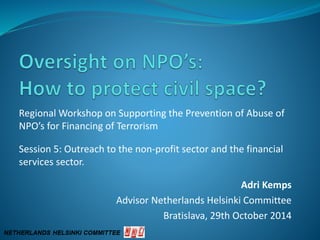
Presentation mr A Kemps Netherlands Helsinki Committee Bratislava 29th October 2014 linkedin
- 1. Regional Workshop on Supporting the Prevention of Abuse of NPO’s for Financing of Terrorism Session 5: Outreach to the non-profit sector and the financial services sector. Adri Kemps Advisor Netherlands Helsinki Committee Bratislava, 29th October 2014
- 2. Introduction The World of Giving Accountability in Society Rule of Law and Civil Space: Human Rights and Space for Civil Society Trends towards Restrictions Best Practices on Good Governance and Accountability Independent (Third Party) Monitoring and Code of Conducts to Prevent Abuse
- 3. Accountability in Society Not-for- Profit (NPO’s) Profit / Commercial Sector State / Public Sector • Code of Conduct • (Independent) Certification • Transparency • Free Market •Competition • Legislation • Taxation • Good Governance • Regulation • Rule of Law
- 4. NPOs need Protection and Public Space Studies and statements in the NGO-sector following Rec. 8 (former SR VIII) found that measures to protect NPOs against abuse should be based on risk- analysis and should be combined with models of good governance and strengthening public trust. There is no single model/solution to uphold transparency and accountability, according to ECNL study (2009) on recent public and self-regulatory initiatives improving transparency and accountability on NPOs in the EU. Since 2012 more than 50 countries have introduced or enacted legislation constraining civil society (EFC, 18/9/2014) Independent studies indicate that in an increasing number of countries human rights and NPO’s are confronted with legal, financial and logistical barriers including harassment of human right-defenders and shrinking civil space (Closing Space, Carnegie Endownment, 2014)
- 5. Regulation and the Work of Civil Society “[…] It will be important that regulations and actions in this area do not harm the legitimate activities of such organizations.” – FATF, 22 October 2012 UN’s CTC stated that efforts to suppress anti-terror finance should not interfere with the ability of civil society organizations to meet their obligations. – 20 November 2012 “[…] As these abuses are addressed, the Security Council recalls the importance of fully respecting the rights to freedom of religion or belief and freedom of expression and association of individuals in civil society […]” – Presidential Statement UN Security Council UN Doc. S/PRST/2013/1, 15 January 2013 Based on FATF’s report on risk of terrorist abuse in NPO’s (June 2014) and engagement process with NPO’s the question arises how the NPO- sector could strengthen its own accountability, and thus protect the work of civil society.
- 6. Challenges NPO’s are highly diversified, both in typology and in the extent of risk, therefore, measures –including those regulating financial transactions– should be in proportion to the risk of abuse. The principle of ‘know your donor, know your benificiary’ is widely accepted within oversight on fundraising. However, its implementation needs to placed at an international level in the light of globalization and digitalization. Prevention of abuse of NPO’s for financing terrorism requires fact-based approaches to avoid undue harm to NPO’s scope and functioning, while protecting security and safety. State-measures to prevent abuse of NPO’s should make use of, and facilitate, mechanisms developed by self-regulatory and independent monitoring structures of civil society. Respecting freedom of association and expression, and considering NPO’s essential role within civil society, state regulation should focus on the protection of NPOs and avoid limiting their scope and functioning.
- 7. The Way Forward: Independent Monitoring Charitable activities and civil engagement are voluntary and private acts of citizens. Therefore, state involvement in these activities should have legal and fiscal facilitation as its primary aim. State can protect and support civil engagement by prosecuting criminal abuse of donations and charitable organizations and by leaving further regulation or ruling to independent monitoring agencies and self-regulation schemes: Code of Conducts, issued by NPO-sector Transparency via databases Seals-of-Approval (Accreditation) by independent agencies Donor Advice by ‘Watchdog’-agencies
- 8. Standards to Implement: ‘Informed Trust’ instead of ‘Blind Trust’ Supervision, good governance and no conflict of interest. Trustful and accurate fundraising, no misleading Internal control and effective evaluation methods Transparency and audited financial statements Reasonable administrative and fundraising costs Stakeholders consultation
- 9. How to Implement the Standards for Oversight 1. Independent standards 2. Independent assessments 3. On behalf of donors 4. Public profile 5. Arrangements with stakeholders and national authorities 6. Cooperation with international bodies for oversight on NPOs A friendly ‘watchdog’
- 10. Conclusion NPOs should develop and support self-regulatory initiatives based on international standards / based on international best practice with independent monitoring (third party) to prevent and act against abuse. Financial institutions should not harm financial transactions of NPOs which participate in independent self-regulatory models to prevent abuse. States should facilitate NPOs and protect human rights and civil space. Independent self-regulatory models can significantly contribute to a culture of transparency and reliability in the NPO- sector, as well as to an improvement of the sector’s processes and best-practices (capacity building).
- 11. Adri Kemps a3kemps@gmail.com Advisor NHC: Netherlands Helsinki Committee. Founded 1987, based in The Hague, the Netherlands (www.nhc.nl) Former Secretary General ICFO: International Committee of Fundraising Organisations, the association of national monitoring bodies (www.icfo.com) Members in Austria, Belgium, Canada, China, Czech Republic, France, Germany, Italy, Japan, Luxembourg, Mexico, The Netherlands, Norway, Spain, Sweden, Switzerland, Taiwan, USA.
